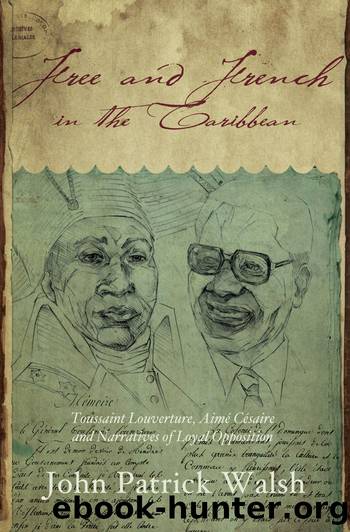Free and French in the Caribbean by John Patrick Walsh

Author:John Patrick Walsh [Walsh, John Patrick]
Language: eng
Format: epub
Tags: History, Caribbean & West Indies, General, Political Science, Colonialism & Post-Colonialism, Historiography
ISBN: 9780253008107
Google: OGDibrp3txsC
Publisher: Indiana University Press
Published: 2013-04-12T01:09:53+00:00
A Haitian Itinerary and a Turn to Political Life
In the spring of 1944 Césaire embarked on his first visit to Haiti. The Allied blockade of Martinique and Guadeloupe had ended only nine months earlier, allowing him to accept an invitation from Pierre Mabille, then Free French cultural attaché in Haiti, to give a series of lectures.9 The centerpiece of the tour was the Congrès International de Philosophie in Port-au-Prince, organized by the Société haïtienne dâétudes scientifiques and Camille Lhérisson, on 20â24 September 1944.10 René Depestre, the celebrated Haitian poet, recalled Mabilleâs generosity and commented that Césaireâs lecture tour was âa major event in our life.â Depestre also remembered that âintellectuals such as Carpentier [the Cuban playwright who visited in 1942] . . . opened windows in the oppressive system of Lescot, in the obscurantism of his men.â11 This reminiscence offered a unique perspective on a stifling political climate, one under which a group of students struggled mightily. According to Gérald Bloncourt, a prominent activist, as the end of the war approached âthings were heating up.â12 Having become increasingly dictatorial since his presidency began in 1941, Ãlie Lescot was granted a mandate to extend his term from five to seven years. The new term began just as Césaire arrived in May. Jacques Roumain, also a writer, politician, and communist activist, had recently returned from Mexico City, where Lescot had appointed him chargé dâaffaires. Roumain had just finished the manuscript of his masterpiece, Les Gouverneurs de la rosée, when he died in August, a short three months into Césaireâs trip.13 The return of the gravely ill Roumain, who was already an icon in Haiti, may have emboldened student and artist communities to demonstrate more actively against the repressive policies of the Lescot administration.14
Over a period of seven months, Césaire charmed his audiences and, according to Bloncourt, âpaved the way for Wifredo Lam and André Bretonâ (Bloncourt and Löwy, 97). The Cuban painter and the French surrealist poet were major intellectual figures who alighted on Haiti, following not only in the footsteps of Césaire but also writers of the Harlem Renaissance, including Langston Hughes and Zora Neale Hurston. According to Depestre, it was Breton who, a year after Césaireâs visit, sparked the circle of activists, including Jacques Stephen Alexis and his cohorts at the journal La Ruche. Mabille invited Breton to give five conferences, including a famous speech on 20 December 1945 at the Rex Theater in Port-au-Prince, where Lescot sat in the front row along with several members of his administration and the military.15 In his lively account of the speech, Depestre wrote of Bretonâs âcontagious lyricismâ: âthe scandalous and subversive atmosphere that had characterized surrealism in the heroic period of its Parisian era was created at the Rex. From the moment André Breton began to speak, we knew that the time was ripe in Haiti to unleash, before the event and mutatis mutandis, a terrific May â68 in the tropics!â16 The Haitian government seized the January 1946 edition of La Ruche
Download
This site does not store any files on its server. We only index and link to content provided by other sites. Please contact the content providers to delete copyright contents if any and email us, we'll remove relevant links or contents immediately.
| Antigua | Bahamas |
| Barbados | Cuba |
| Dominica | Dominican Republic |
| Grenada | Haiti |
| Jamaica | Saint Kitts |
| Saint Lucia | Saint Vincent |
| Trinidad and Tobago |
Cat's cradle by Kurt Vonnegut(15293)
Pimp by Iceberg Slim(14463)
4 3 2 1: A Novel by Paul Auster(12352)
Underground: A Human History of the Worlds Beneath Our Feet by Will Hunt(12072)
The Radium Girls by Kate Moore(12000)
Wiseguy by Nicholas Pileggi(5740)
The Fire Next Time by James Baldwin(5408)
Perfect Rhythm by Jae(5382)
American History Stories, Volume III (Yesterday's Classics) by Pratt Mara L(5283)
Paper Towns by Green John(5160)
Pale Blue Dot by Carl Sagan(4981)
A Higher Loyalty: Truth, Lies, and Leadership by James Comey(4937)
The Mayflower and the Pilgrims' New World by Nathaniel Philbrick(4474)
The Doomsday Machine by Daniel Ellsberg(4472)
Killers of the Flower Moon: The Osage Murders and the Birth of the FBI by David Grann(4423)
The Sympathizer by Viet Thanh Nguyen(4370)
Too Much and Not the Mood by Durga Chew-Bose(4319)
The Borden Murders by Sarah Miller(4298)
Sticky Fingers by Joe Hagan(4167)
